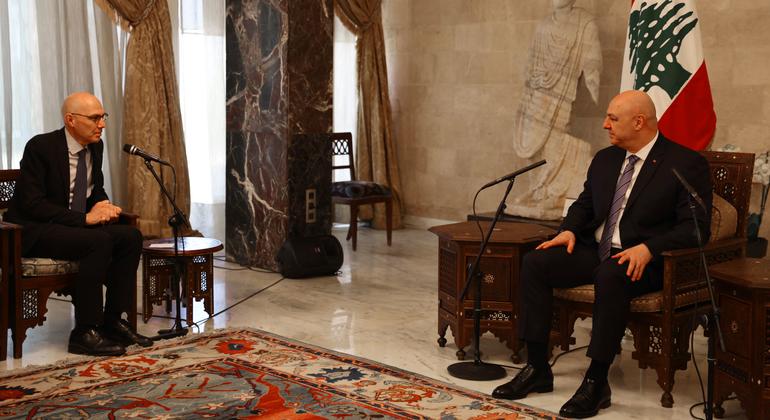
“I must say I arrive with a heavy heart, given the decades of complex trauma in both countries, but there are signs of a new beginning” in Lebanon said Volker Türk, speaking in the capital Beirut.
On Wednesday, he traveled to Damascus for his first trip to Syria, where he called for an “urgent reconsideration” of sanctions following constructive talks with the head of the transitional authority.
Expectations are high
Despite the immense challenges, he said he feels hopeful for Lebanon’s future. He stressed the importance of the continuing ceasefire between Lebanon and Israel.
“Despite worrying reports of continued destruction by Israeli forces in towns and villages in southern Lebanon, the vital ceasefire between Lebanon and Israel remains broadly in place,” he said. said.
Lebanon recently elected a new president and prime minister, ending two years of political deadlock and opening the door to much-needed reforms.
A time of reform and renewal
“The election of a new leadership builds momentum for political stability, economic recovery, and the implementation of long-overdue and important reforms to address the multiple socio-economic crises and deep inequalities facing Lebanon. “is on the rise,” the High Commissioner emphasized.
A vibrant civil society in Lebanon supports full respect for freedom of expression and association, combats discrimination, improves women’s participation and representation, guarantees full gender equality, recognizes and includes people with disabilities, and supports the most marginalized people. It has emphasized the need to ensure the protection of the human rights of those affected. At risk.
“Respect for human rights requires concrete and sustained investment in the rule of law,” he noted.
look back on the past
The High Commissioner also called for the reopening of an independent investigation into the Beirut port explosion in August 2020, which killed more than 218 people and left hundreds of thousands homeless.
“I reiterate that those responsible for that tragedy must be held accountable and support my office in this regard,” he said.
Lebanon is currently experiencing the worst economic decline in modern history, with severe currency devaluation and triple-digit inflation impacting basic goods.
According to the World Bank, 44 percent of the population lives below the poverty line and 2.5 million people are in need of food assistance. “We need a renewed social contract that rebuilds social structures and restores trust in state institutions,” the High Commissioner said.
The past few months of fighting between Israeli forces and Hezbollah militants in the shadow of the Gaza war have resulted in significant loss of life and displacement. More than 4,000 lives were reportedly lost, including more than 1,100 women and children and more than 200 medical workers and journalists.
The ceasefire, which began in late November 2024, remains fragile but has been maintained despite violations.
“My Office stands ready to strengthen its human rights work and stand by the country’s progress,” the High Commissioner concluded, stressing the need for lasting peace and the safe return of civilians.



